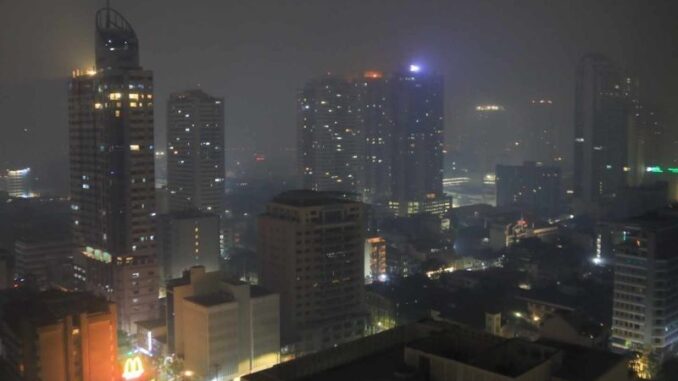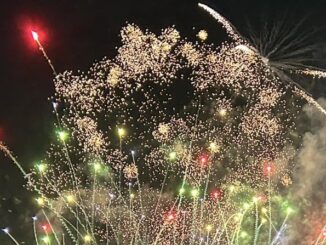
MANILA, Philippines — Makati City recorded the highest air pollution levels in Metro Manila as the country ushered in the New Year, the Department of Environment and Natural Resources (DENR) reported on Thursday, January 2.
The chief of the DENR Environmental Management Bureau (EMB) Air Quality Management Section (AQMS) said their monitoring detected elevated pollutant levels in the air just hours after midnight on Wednesday, January 1.
“So during New Year, or at the peak, we observed from midnight to 2 a.m. that the levels rose up to 150% higher than our guideline values for PM10, reaching [an air quality index of] 390,” DENR-EMB AQMS Chief Jundy Del Soccoro said in Filipino in an interview with Super Radyo DZBB 594.
“Based on our data, we observed that the areas in Makati City are the ones that saw the highest increase,” he added.
What is particulate matter? The monitored pollutants, PM10 and PM2.5, are particulate matter measuring 10 and 2.5 micrometers, respectively — far smaller than the 50 to 70 micrometers typical of human hair.
These fine particles, resembling dust and aerosols, can be inhaled and pose significant health risks. They may also contaminate water and soil.
According to Swiss firm IQAir, PM10 pollutants can penetrate the lungs when inhaled, while PM2.5, due to its smaller size, may be absorbed into the bloodstream.
Both types of particles are commonly found in smoke, dust, salts, acids and metals — most of which are produced by lighting up firecrackers.
Fireworks are generally composed of gunpowder, which may contain sulfur, charcoal, potassium nitrate and other chemicals for their color.
Hazardous, very unhealthy. With an air quality index (AQI) of 390 for PM10, the air is classified as “hazardous,” signaling a high risk of irritation and adverse health effects.
For PM2.5, Soccoro said pollution levels reached 186, which is considered “very unhealthy.”
“It’s not just dirty, the air is also toxic because the substances that give color to firecrackers contain toxic substances. These are heavy metals… which mix with the fine particles,” he added in Filipino.
Soccoro suggested that Makati’s severe air pollution could also be attributed to pollutants from neighboring cities carried by the winds.
IQAir recorded similar pollution levels in Metro Manila cities, with Manila even being the most polluted around 11 a.m. on New Year’s Day.
RELATED: Metro Manila cities record ‘unhealthy’ air quality after New Year revelry
Will the pollutants stay? Soccoro explained that the pollutants’ dispersion will depend on weather conditions. If it rains, the polluted air is much easier to flush out, he added.
Since the Philippines welcomed the New Year with light showers in various areas due to three weather systems, the DENR-EMB AQMS chief said pollution levels slightly eased by around 3 a.m.
He also said that the pollutants are likely to settle on the ground and in water, threatening plants and animals in the ecosystem, especially when some pollutants remain in the atmosphere for extended periods.
“[The pollutants] may disperse, but if not, and if they move slowly, they may stay. … It also depends on the type of pollutant present. Some are persistent and remain. With firecrackers, the substances it is composed of are really different,” Soccoro added in Filipino.
The public is advised to wear face masks and avoid outdoor activities, especially those with preexisting conditions, as well as sensitive groups such as children, the elderly and pregnant individuals.





Be the first to comment